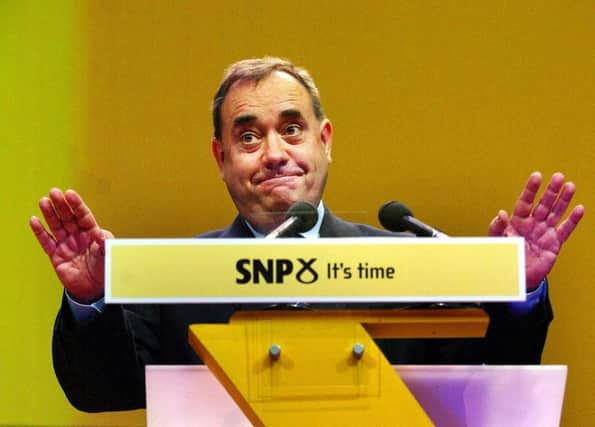Leaders: SNP must learn lesson over empty promises


It did not take long, after the Nationalists were settled into government, for this promise to be revealed as poorly thought out and, to all intents and purposes, unworkable.
The problems were, in hindsight, obvious. Smaller class sizes, without a reduction in the school roll, would necessitate a need for more classrooms. Few schools had any empty ones going spare.
Advertisement
Hide AdAdvertisement
Hide AdIn a humiliating climbdown, SNP ministers had to modify their ambition, and a more modest proposal was passed into legislation in 2010 limiting P1 classes to a maximum of 25.
Although this target is being met, new figures show older children in Scotland’s primary schools are seeing class sizes rise. The average primary class size grew from 22.7 in 2012 to 23.2 this year. And in the first three years of primary, the percentage of pupils in class sizes of 18 or fewer dropped from 18.8 per cent in 2012 to 13.6 per cent this year.
Scottish ministers have nowhere to hide on this. They, after all, were responsible for making this a political battleground in the first place. So ministers cannot avoid the criticism they received yesterday from Labour’s Kezia Dugdale, who said of the Cabinet secretary for education: “Mike Russell proclaims this as a success. It can only be so in the parallel universe of the SNP.”
Promising the earth and failing to deliver can only feed people’s cynicism about politicians in general. There is a salutary lesson here in political parties having a mind to the practicalities of the real world when conjuring up lavish promises with which to attract votes.
This is an embarrassment for the SNP government in another regard too. Last month, in front of the world’s media in a press conference at the Glasgow Science Centre, the First Minister and his deputy unveiled their white paper for an independent Scotland. Included, in a curious departure from the usually strict protocols in such matters, was the SNP’s manifesto for the first Holyrood election after independence.
This included a headline-grabbing promise that pre-school children would be entitled to 30 hours of free childcare a week – the same number of hours as a child at primary school. This would benefit 240,000 children, saving families £4,600 per child each year.
Viewed in the light of the latest figures on class sizes, the SNP’s independence promise on child care invites a degree of scepticism. Why should Scots take this new SNP promise at face value when the party’s last promise on improving the lot of young children proved so wide of the mark?
With all politicians’ stock still so low, the benefit of the doubt may be hard to come by.
No excuses left for banking failures
Advertisement
Hide AdAdvertisement
Hide AdWhen new Royal Bank of Scotland chief executive Ross McEwan recently apologised for the state of the bank’s antique computer systems, this newspaper asked a question: what other dark secrets were lurking under the RBS woodpile? Yesterday there was an answer to that question.
The bank last night confirmed it is to pay £61 million ($100m) to the Federal Reserve and other US banking authorities for breaking international sanctions. A statement from RBS said the bank “acknowledges and deeply regrets these failings”.
International sanctions are there for a reason. Their purpose is to bring pressure on dangerous and often murderous regimes. And yet RBS allowed these sanctions to be by-passed, and for the will of the international community to be defied, all the while providing a tidy profit and – doubtless – a bonus or two for already well-paid bankers.
Bankers claim the culture of the industry has changed. But other evidence yesterday suggests otherwise. Lloyds was fined £28m for putting unacceptable and undue pressure on its staff to sell financial products that did not meet people’s needs. And this was done, not in the bad old days of pre-crash banking, before the sector was supposedly brought back to its senses – no, this happened within the past three years.
Senior bankers insist a new culture is now operating, and that they are working within a new moral and professional framework. But we’ve heard this before. Why should we trust the banks when it seems barely a month goes by without evidence to the contrary? It is no longer sufficient for bankers to assert that all in the garden is rosy. From now on, they are going to have to prove it.